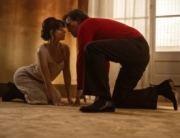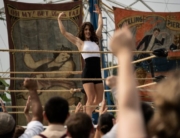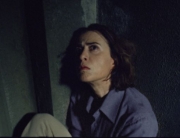For her latest film, French writer-director-actor Maïwenn takes on the true story of an 18th-century French courtesan who became the unlikely favorite of King Louis XV, a subject far removed from her earlier directorial efforts: 2011’s gritty cop drama Polisse and 2015’s frenzied modern romance Mon Roi.
Jeanne is born to a poor mother (she never knew who her father was) and is sent away to a convent, from which she is thrown out of at age 15; she’s more interested in earthly pleasures, like reading. She heads to Paris where she becomes a companion to the rich and famous —the powerful Duke of Richelieu (Pierre Richard) introduces her to King Louis. Even though she is in a loving relationship with Count Guillaume du Barry (Melvil Poupaud), her winning personality and sexual prowess proves irresistible to the king. After his wife, Queen Marie, dies, he sets Jeanne up at the royal palace of Versailles as his favored (although not only) mistress, despite the growing consternation of his grown daughters. Jeanne’s behavior causes a scandal at the palace, as she dresses like a man and treats a young Black boy, Zamor (Ibrahim Yaffa), whom the king gives to her as a gift upon her arrival at Versailles, more like a son than a slave. (Ironically, Louis-Benoit Zamor would denounce Jeanne during the French Revolution.)
In many ways, Jeanne du Barry is a conventional costume drama about mostly pompous and entitled characters interacting amid the usual opulent sets and costumes. However, director Maïwenn has admitted to wanting to emulate the exquisite visual palette of Kubrick’s classic Barry Lyndon—unsurprisingly, also a film about a low-class protagonist in 18th-century Europe entering the rarefied world of nobility, but only briefly. So Maïwenn and her marvelous cinematographer Laurent Dailland create striking tableaux set among the gorgeous interiors and beautiful landscapes. Indeed, the ravishing interior scenes are candlelit, while other aspects of Barry Lyndon—slow pans, fades, omniscient narrator, even an overtly emotional scene concerning the death of a child—are also prevalent here.
Yet Maïwenn’s film, a tragicomedy of manners that looks at a highly patriarchal society from a woman’s point of view, isn’t simply derivative. In an amusing sequence after Jeanne spends her first night with the king, she watches, unseen behind a window, the ludicrous posturing of royal life: the daily parade into the king’s chambers of Louis’s family, members of his court, and a priest for morning prayers, followed by the king’s morning bathroom break in front of everyone. (He’s hidden from all by a makeshift four-sided curtain). More sequences with such knowing humor would have been welcome. Instead, the crushing weight of a society that will never accept her becomes increasingly wearying, even enervating, to watch.
As a performer, Maïwenn’s natural exuberance makes Jeanne a lively, always compelling presence, even when her direction and script are stuck in a repetitious rut. Loli Bahia, who looks conspicuously like a younger Maïwenn, plays the teenaged Jeanne with equal aplomb. As Jean-Benjamin de la Borde, the king’s most trusted valet who becomes Jeanne’s greatest advocate at court, Benjamin Lavernhe gives an exceptionally fine performance.
And what of Johnny Depp as Louis XV? He looks right—his bemused expression embodies the king’s attitude toward his minions and as he revels in his illicit relationship with Jeanne. He also speaks French well enough, but Maïwenn, perhaps hedging her bets, has smartly given him little dialogue. This works best in the deliberately awkward scene where Jeanne and Louis first meet, but Depp is mainly a quiet, subdued presence that becomes a gaping dramatic hole in the film, which, for all its visual flair, doesn’t fully illuminate a most remarkable woman and the equally remarkable era she lived in.



















Leave A Comment